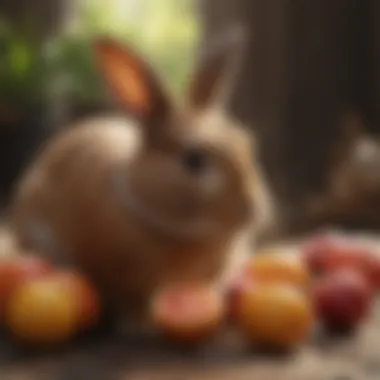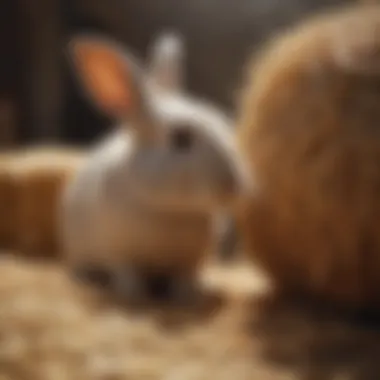Essential Foods for Bunnies: A Complete Guide


Intro
Understanding the dietary needs of domestic rabbits is essential for any pet owner. Proper nutrition is crucial for the well-being and longevity of these animals. Bunnies require a delicate balance of hay, vegetables, fruits, and pellets to thrive. However, misinformation about which foods are safe can lead to health complications. This guide provides clarity on what constitutes a beneficial diet for rabbits while identifying harmful foods to avoid. The goal is to equip rabbit owners with comprehensive knowledge, promoting healthier lifestyles for their pets.
Pet Care and Grooming
Importance of Regular Care
Regular care encompasses a wide range of activities that ensure your rabbit stays healthy and happy. Grooming, housing conditions, and monitoring health behaviors all play a vital role. Bunnies are naturally clean animals, yet they require assistance in maintaining their coats, particularly long-haired breeds. Regular brushing prevents matting and reduces shedding. Additionally, a clean environment contributes to overall health, as it can help prevent diseases.
Grooming Techniques by Pet Type
Different rabbit breeds have varying grooming needs. Long-haired breeds like the Angora require daily grooming to prevent mats. Short-haired breeds benefit from less frequent grooming but should still be brushed weekly. Always use the appropriate tools, such as a slicker brush or a grooming glove. Be gentle during this process, as rabbits can easily become stressed.
Tools and Products Recommendations
For effective grooming, specific tools are necessary. Here are some recommended products:
- Slicker brush: Great for removing loose fur.
- Grooming glove: Convenient and less intimidating for rabbits.
- Nail clippers: Keeping claw length manageable is important to prevent injury.
Using the right tools minimizes stress during grooming sessions.
Seasonal Care Tips
Seasonal changes can affect your rabbit's grooming needs. In spring and fall, rabbits often shed their fur. During these times, increased grooming is vital to help manage excess fur. Also, monitor their living environment. Ensure that they are not too cold in winter or overheated in summer. Maintaining appropriate indoor temperatures is crucial for their health.
Health and Nutrition
Understanding Pet Nutrition
Rabbits are herbivores with unique nutritional requirements. Their diet should chiefly consist of hay, which provides the necessary fiber for digestion. High-fiber diets encourage healthy gut function and prevent obesity. Pairing hay with fresh vegetables offers essential vitamins and minerals.
Common Health Issues by Species
Rabbits tend to suffer from several common health problems linked to diet:
- Dental issues: Insufficient chewing can lead to overgrown teeth.
- Gastrointestinal stasis: This condition arises from low fiber intake and can become critical quickly.
- Obesity: Overfeeding high-calorie treats can lead to obesity.
Preventive Care and Regular Check-Ups
Regular veterinary visits are essential for maintaining overall health. Routine check-ups allow for monitoring of diet, weight, and dental health. A veterinarian can provide personalized dietary advice suited to your rabbit's unique needs.
Food and Dietary Advice
When considering what to feed your bunny, prioritize high-fiber hay, such as Timothy hay. Leafy greens like romaine lettuce and parsley can be offered daily, but limit the amount of fruits and other sugary vegetables. Here are some safe options to include:
- Hay: Timothy or Orchard grass
- Vegetables: Kale, cilantro, and bell peppers
- Fruits: Apples (without seeds) and blueberries in moderation
Avoid starch-heavy foods and processed pellets that do not meet their nutritional needs.
Behavioral Training
Basics of Positive Reinforcement
Using positive reinforcement is effective in training bunnies. Bunnies respond well to treats and praise. This approach builds trust and encourages the desired behaviors. Avoid negative associations or punishment, as they can lead to fear and anxiety.
Training Techniques Users Can Apply
Basic commands can be taught to rabbits. Start with simple tasks like
Preface to Bunny Nutrition
Understanding the nuances of bunny nutrition is essential for every pet owner. Rabbits are unique creatures with specific dietary needs that, if met, can significantly contribute to their overall health and happiness. An appropriate diet not only supports their digestive system but also promotes healthy growth, a shiny coat, and vitality.
Proper nutrition plays a critical role in preventing various health issues in rabbits. When a bunny's diet lacks important nutrients, it may lead to obesity, dental problems, or gastrointestinal disorders. Pet owners must realize that just because a food is edible does not mean it is appropriate for rabbits. Knowing what foods contribute positively to a rabbit's diet helps ensure their well-being.


As we explore this topic further, we will discuss various food categories suitable for rabbits. Each category will demonstrate how to enhance your bunny's nutrition through proper choices of hay, vegetables, fruits, pellets, and even treats. Moreover, we will highlight common misconceptions about bunny diets that could lead to unintentional harm.
Key Points to Consider:
- Diet Diversity: A varied diet keeps rabbits healthy and active.
- Nutritional Balance: Each food type contributes essential nutrients.
- Preventive Care: Understanding appropriate foods helps avoid disease.
In summary, educating yourself about bunny nutrition is vital in providing a well-balanced diet. As you read on, you will gain the knowledge needed to make informed choices in your bunny’s feeding regimen. This article aims to serve as a guide for pet owners, prospective adopters, and animal lovers to foster a healthier lifestyle for these beloved companions.
The Digestive System of Rabbits
The digestive system of rabbits is a focal point in understanding their dietary needs. Rabbits have a unique digestive tract that differentiates them from many other pets. This characteristic makes it essential for pet owners to comprehend how it works to ensure that bunnies receive appropriate nutrition. A rabbit's digestive system is specially adapted to process a high-fiber diet, primarily consisting of hay and fresh vegetables. Hence, understanding this system can provide significant benefits.
Unique Digestive Features
Rabbits possess a complex digestive system. Their gastrointestinal tract includes a large cecum, which plays a crucial role in fermentation. This organ allows rabbits to break down fibrous plant materials, recovering nutrients that are otherwise undigestible.
One notable aspect of rabbit digestion is the process of cecotrophy. This is the consumption of soft feces, known as cecotropes. Bunnies do this to maximize their nutrient intake. They excrete these droppings during the night or early morning and eat them immediately. This behavior ensures that essential nutrients and vitamins, particularly from B-group vitamins are assimilated into their bodies.
It's also essential to note the relatively slow transit time through a rabbit's gut. This feature allows for proper breakdown and absorption of nutrients from their fibrous diet. If a rabbit's diet lacks appropriate fiber, it can lead to severe digestive issues. Pet owners must recognize these unique aspects to monitor their pet's health effectively.
Importance of Fiber
Fiber holds a critical position in a rabbit's diet. It is indispensable for proper gut function and prevents various health issues, including obesity and gastrointestinal stasis. A diet rich in fiber encourages normal gut motility and helps keep the digestive system functioning efficiently.
Rabbits primarily need indigestible fiber to keep their intestines healthy. This fiber source comes from hay, a primary dietary building block. Numerous studies highlight that a lack of fiber can lead to a range of problems, such as dental issues, because rabbits’ teeth continuously grow and require wear from chewing fibrous materials.
Moreover, fiber-rich diets have been linked to healthy weight management. Excess weight can put stress on a rabbit's organs and negatively impact its overall health. Therefore, a well-rounded diet incorporating abundant fiber not only aids digestion but also contributes to a longer, healthier life for bunnies.
Key points on fiber for bunnies:
- Fiber aids in digestion and prevents gastrointestinal stasis.
- Essential for dental health by wearing down their continuously growing teeth.
- Assists in weight management and overall health.
Essential Food Categories for Rabbits
Understanding the essential food categories for rabbits is crucial for any pet owner. These categories dictate the main components of a healthy diet. Each category has specific benefits that contribute to a rabbit's overall health and well-being. It is necessary to ensure your bunny's nutrition is balanced and varied to prevent health issues.
Hay
Types of Hay
Hay is the cornerstone of a rabbit's diet. The types of hay, such as Timothy hay, Orchard grass, and Meadow hay, are significant for digestive health. Timothy hay, for example, is rich in fiber, which is essential for proper digestion and maintaining a healthy gut. The variety of hays allows for a more enjoyable eating experience for rabbits, as they can engage with different textures and flavors.
Benefits of Hay in Diet
The benefits of hay in a rabbit's diet are extensive. It supports healthy teeth by providing the necessary wear through chewing. Additionally, hay plays a vital role in preventing obesity by filling the bunny’s stomach without providing too many calories. Regular consumption of hay ensures that rabbits have a continuous source of fiber, vital for digestive function.
Vegetables
Leafy Greens
Leafy greens are another important category of foods for rabbits. These include options like romaine lettuce, kale, and cilantro. Leafy greens can provide essential vitamins and minerals while also adding moisture to the diet. Their high fiber content supports digestion and can be offered as a daily treat.
Root Vegetables
Root vegetables, like carrots and radishes, have a different role in a bunny's diet. While they can provide some nutrients, they are higher in sugar compared to leafy greens. This means they should be offered sparingly. Though rabbits will enjoy the crunchiness and sweetness, moderation is important to prevent potential weight gain and dental problems.
Non-leafy Vegetables
Non-leafy vegetables, such as bell peppers and cucumber, form an additional layer of nutritional diversity. These vegetables introduce different vitamins that can enhance health and vitality. Non-leafy vegetables are generally low in calories and can be offered more freely, but care should be taken not to overwhelm the diet with these options.
Fruits
Safe Fruits for Bunnies
Fruits can be a delightful addition to a rabbit's diet. Safe fruits like apples, strawberries, and blueberries provide a natural source of sugars, vitamins, and antioxidants. However, it's crucial to ensure these fruits are served in moderation due to their high sugar content. They should be a small part of the overall diet.


Feed in Moderation
Feeding fruits in moderation is central to maintaining a balanced diet. While fruits are nutritious, excessive amounts can lead to digestive upset or obesity. A few pieces a couple of times a week is usually sufficient to satisfy a rabbit’s cravings without compromising health.
Pellets
Types of Pellets
Pellets should not be the sole component of a rabbit's diet but are important for providing balanced nutrition. Different types of pellets exist, including timothy-based and alfalfa-based options. Choosing a high-quality pellet that is appropriate for the age and health of the rabbit can make a significant difference in health. Timothy-based pellets are generally preferable for adult rabbits.
Choosing the Right Pellets
Choosing the right pellets involves examining ingredients and avoiding those with added sugars or fillers. Pellets should be high in fiber and low in protein, as too much protein can lead to health problems. Ensuring that the chosen pellet matches the rabbit's specific needs is essential for maintaining its health.
Treats
Healthy Treat Options
Healthy treat options can keep your bunny engaged and happy. Things like small pieces of fresh fruit or vegetable scraps can serve as excellent treats. Offering low-calorie options helps prevent obesity while reinforcing positive behavior.
Limitations on Treats
Limitations on treats are crucial for a balanced diet. Treats should only constitute a small percentage of the diet. Overindulgence can lead to serious health issues, including obesity and dental problems. It's essential to control treat intake and focus on the primary diet of hay, vegetables, and pellets.
Proper nutrition is vital for maintaining a rabbit's overall health. Focusing on these essential food categories promotes a long and happy life for your bunny.
Foods to Avoid
Understanding what foods to avoid is crucial for maintaining the health and well-being of your rabbit. While some foods may seem harmless, others can lead to serious health issues. Recognizing these foods helps pet owners create a safe and healthy environment for their bunnies. Ensuring your rabbit avoids harmful items is a significant step towards optimal nutrition.
Toxic Foods
Toxic foods present a particular risk for rabbits. These foods can cause severe internal damage and potentially be life-threatening. It is important to be aware of such foods to prevent unintended harm.
Commonly Ingested Toxic Foods
Some common foods that rabbits might ingest yet are toxic include:
- Avocado: Contains persin, which is harmful to rabbits.
- Chocolate: Contains theobromine and caffeine, both toxic to many animals.
- Onion and Garlic: These can cause anemia in rabbits.
- Rhubarb Leaves: High levels of oxalic acid can lead to kidney failure.
Recognizing these foods is essential for responsible pet ownership. The unfortunate reality is that rabbits may inadvertently consume these foods if left unattended. Therefore, a proactive approach involving strict dietary controls can mitigate risk.
Signs of Toxicity
If a rabbit ingests toxic foods, the signs of toxicity can vary but often include:
- Lethargy: A significant drop in energy can occur.
- Vomiting: Though rare in rabbits, it can happen.
- Diarrhea: This is a common symptom when anything unusual is ingested.
- Rapid Breathing: Often indicates distress or internal issues.
Monitoring behavior and physical condition is key. The earlier you spot symptoms, the quicker proper care can commence, potentially saving your rabbit's life. Prompt veterinary assistance is essential if any of these signs appear.
Unhealthy Foods
Unhealthy foods should also be avoided to prevent long-term health problems. These types of foods are not outright toxic but can lead to obesity and other health issues over time.
Sugary and Starchy Foods
Sugary and starchy foods, such as sugary cereals or products made with refined grains, should never be included in a rabbit's diet. These foods are high in calories but low in nutritional value. Regular consumption can lead to obesity and dental problems.
- Contributes to weight gain
- Increases risk of diabetes
Therefore, it's important to remain vigilant about what goes into your rabbit's diet. Being strict about these foods helps maintain a healthy weight and reduces the risk of metabolic diseases.
Processed Foods
Processed foods, including those high in preservatives, should also be avoided. These foods often lack essential nutrients and can contribute to a range of health problems.


- Typically contain additives that are harmful to rabbits
- Lack the dietary fiber that is crucial for digestion
The unique characteristic of processed foods is that while they may seem convenient, they offer great disadvantages. Opting for fresh, natural options ensures your rabbit's diet is well-balanced and nutritious. Avoiding processed items can greatly enhance your rabbit's quality of life.
Remember, a rabbit’s diet should be diverse, safe, and nourishing to ensure a happy, healthy life.
Hydration Needs
Proper hydration is a critical aspect of maintaining the overall health of your rabbit. While many focus solely on the types of food, the importance of water often gets overlooked. Water is vital for various bodily functions, including digestion, nutrient absorption, and temperature regulation. In fact, adequate hydration is essential for a healthy metabolic process. Thus, understanding the water needs of rabbits is crucial for any pet owner.
Water Requirements for Rabbits
Rabbits require a substantial amount of fresh water every day. On average, an adult rabbit should have access to about 50 to 150 mL of water per kilogram of body weight daily. This means a rabbit weighing around 2 kg may need up to 300 mL of water each day. Factors such as diet, environment, and activity level can influence these requirements.
- Diet Impact: Rabbits consuming a high-fiber diet with fresh vegetables may drink less water due to the moisture content in their food.
- Temperature Variations: In hotter climates, rabbits may require more water to prevent overheating.
- Physical Activity: More active rabbits will also have higher water needs.
Always ensure that your rabbit has access to clean, fresh water. Offering water in a bowl or a bottle is your choice, but it should be checked regularly to avoid contamination.
Signs of Dehydration
Recognizing the signs of dehydration in rabbits is vital for prompt intervention. Dehydrated rabbits can face severe health risks, including organ failure and even death. Here are some signs to watch for:
- Lethargy: A decrease in energy levels or less eagerness to engage in normal activities.
- Dry Mouth or Gums: When you gently pull back your rabbit's lip, the gums should appear moist and pink. Dry or tacky gums are a clear sign of dehydration.
- Decreased Urination: If your rabbit is not producing as much urine as usual, it can indicate a serious hydration issue.
- Skin Tent Test: Gently pinch the skin on a rabbit's back. If it takes longer than a second to return to normal, your rabbit may be dehydrated.
Maintaining proper hydration is just as crucial as feeding a balanced diet. Without sufficient water, even the best diet cannot prevent health issues.
Be sure to monitor your rabbit’s drinking habits and always consult a veterinarian if you suspect dehydration. Prevention is key; providing easy access to fresh water is essential for your rabbit’s health.
Common Misconceptions About Bunny Diet
Understanding bunny nutrition can be complicated but is crucial for the health of pet rabbits. Many pet owners hold misconceptions that can lead to unhealthy dietary choices. Clarifying these misunderstandings can help ensure that rabbits receive balanced and appropriate nutrition.
Misconception 1: Rabbits Can Eat Almost Anything
One common belief is that rabbits are not picky eaters and can consume a wide range of human foods. This is misleading. While rabbits have diverse diets, not all foods are safe for them. Certain fruits, vegetables, and other foods can be harmful or even toxic. Knowing what is safe is essential. Foods like chocolate and garlic should never be fed, as they can cause severe health problems.
Misconception 2: Hay is Just a Filler
Some may think of hay simply as a filler food. In truth, hay serves a critical role in a rabbit’s diet. Hay is rich in fiber, which is essential for digestion. It also helps maintain dental health by promoting wear on a rabbit's teeth. Without sufficient hay, rabbits may suffer from gastrointestinal stasis or dental issues.
Misconception 3: Fruits Are a Primary Food Source
Another frequent error is considering fruits as a staple in a bunny's diet. While fruits are a nice treat, rabbits should consume them in moderation due to their high sugar content. Relying on fruits can lead to obesity or other health issues. Instead, the focus should be on a balanced diet featuring hay, vegetables, and a small number of fruits.
Misconception 4: Commercial Pellets Are Enough
Many believe that high-quality commercial pellets provide all necessary nutrition for rabbits. While pellets are an important component, they cannot replace the need for fresh hay and vegetables. Some pellets are also high in calories and low in fiber, which is not ideal. It is crucial to choose the right pellets and ensure they are accompanied by an array of fresh greens.
Misconception 5: Water Isn’t That Important
A final misconception is that rabbits don’t require much water. This is not true. Rabbits need a constant supply of fresh water. Dehydration can lead to severe health issues. Ensure that the water is always available and changed regularly for optimal health.
"Correcting misconceptions about bunny diets can significantly affect their health and well-being."
By debunking these common myths, pet owners can make informed choices about their bunnies’ diets. A better understanding leads to improved nutrition and overall health, enhancing the quality of life for these beloved pets.
Finale: Ensuring a Balanced Diet for Your Bunny
In the exploration of bunny nutrition, ensuring a balanced diet stands central to maintaining the health and happiness of your pet rabbit. The variety of foods that bunnies can eat has significant implications for their physical well-being. This guide has extensively detailed essential food categories along with specific foods that should be avoided.
A balanced diet is vital for proper digestion, weight management, and overall vitality in rabbits. Bunnies have unique nutritional requirements. Their digestive systems rely heavily on a continuous supply of fiber, primarily from hay. Hay serves as the foundation of their diet, providing not only essential nutrients but also promoting healthy gut function. Additionally, incorporating a range of vegetables, fruits, and high-quality pellets can further augment their nutritional intake.
Here are key takeaways to consider for your bunny’s diet:
- Fiber Intake: Ensure a constant supply of hay to support digestive health.
- Vegetable Variety: Include leafy greens like romaine lettuce and kale while being cautious with root vegetables.
- Moderation in Fruits: Offer fruits as occasional treats to avoid excess sugar intake.
- Quality Pellets: Choose pellets that are high in fiber and low in additives.
Remember simplicity is crucial when it comes to your bunny's feeding regimen. Too many changes can upset their digestive health.
Balancing these food categories also involves understanding what to avoid. Foods that are toxic or unhealthy can lead to serious health issues. Educating yourself about such foods, as emphasized in the earlier sections, is equally important.
Monitoring your bunny's overall health and adjusting their diet as needed can yield significant benefits. Observing their behavior, weight, and fur condition can provide insight into their nutritional status. Recommendations may evolve as rabbits age or face different health challenges.















